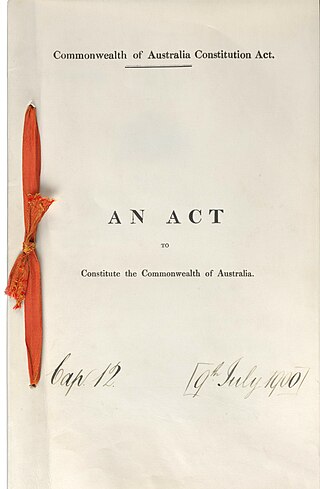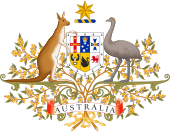
An Official Secrets Act (OSA) is legislation that provides for the protection of state secrets and official information, mainly related to national security but in unrevised form can include all information held by government bodies.

Conscription in Australia, also known as National Service following the Second World War, has a controversial history which dates back to the implementation of compulsory military training and service in the first years of Australia's nationhood. Military conscription for peacetime service was abolished in 1972.

On 22 September 1951, a referendum was held in Australia which sought approval to alter the Australian Constitution to give Parliament the power to make laws regarding communism and communists, so that the Parliament would be empowered to instate a law similar to the Communist Party Dissolution Act of 1950. It was not carried.
The Constitution Alteration Bill 1946, was a successful proposal to alter the Australian Constitution to give the Commonwealth power over a range of social services. The question was put to a referendum in the 1946 Australian referendum with two other (unrelated) questions. It was carried and inserted into section 51 of the Australian Constitution.

Compulsory military training (CMT), a form of conscription, was practised for males in New Zealand between 1909 and 1972. Military training in New Zealand has been voluntary before then and ever since.
Australian sedition law was an area of the criminal law of Australia relating to the crime of sedition.

In the United Kingdom, devolved matters are the areas of public policy where the Parliament of the United Kingdom has devolved its legislative power to the national legislatures of Scotland, Wales and Northern Ireland, while reserved matters and excepted matters are the areas where the UK Parliament retains exclusive power to legislate.
Visiting Forces Act is a title often given to laws governing the status of military personnel while they are visiting areas under the jurisdiction of another country and/or while forces of one country are attached to or serving with forces of another country.

The National Service Act 1964 (Cth) is a repealed amendment of the Parliament of the Commonwealth of Australia, passed on 24 November 1964. It amended the National Service Act 1951 to require 20-year-old males to serve in the Army for a period of twenty-four months of continuous service followed by three years in the Reserve.
Section 51(vi) of the Australian Constitution, commonly called the defence power, is a subsection of Section 51 of the Australian Constitution that gives the Commonwealth Parliament the right to legislate with respect to the defence of Australia and the control of the defence forces. The High Court has adopted a different approach to the interpretation of the defence power, which emphasises the purpose of the legislation, primarily the defence of Australia, rather than the subject matter.

Justin Fox Greenlaw Foxton was an Australian barrister and politician. He served in the Queensland Legislative Assembly from 1883 to 1904 and held ministerial office in several liberal governments. He later represented the seat of Brisbane in federal parliament (1906–1910) and was a minister without portfolio under Alfred Deakin. He was a long-serving member of Queensland's colonial militia and gained the rank of colonel.

The Emergency Powers Act 1939 (EPA) was an Act of the Oireachtas enacted on 3 September 1939, after an official state of emergency had been declared on 2 September 1939 in response to the outbreak of the Second World War. The Act empowered the government to:
make provisions for securing the public safety and the preservation of the state in time of war and, in particular, to make provision for the maintenance of public order and for the provision and control of supplies and services essential to the life of the community, and to provide for divers and other matters connected with the matters aforesaid.

The Constitution of Australia is the supreme law of Australia. It is a written constitution that sets down the political structure of Australia as a federation under a constitutional monarchy governed with a parliamentary system and outlines the structure and powers of the Commonwealth of Australia's three constituent parts: the executive, legislature, and judiciary.

The Sex Discrimination Act 1984 is an Act of the Parliament of Australia which prohibits discrimination on the basis of mainly sexism, homophobia, transphobia and biphobia, but also sex, marital or relationship status, actual or potential pregnancy, sexual orientation, gender identity, intersex status or breastfeeding in a range of areas of public life. These areas include work, accommodation, education, the provision of goods, facilities and services, the activities of clubs and the administration of Commonwealth laws and programs. The Australian Human Rights Commission investigates alleged breaches of the Act. The office of Sex Discrimination Commissioner, created in 1984 alongside the Act, is a specialist commissioner within the AHRC.
The Australian Military Court (AMC) was a military service tribunal established in 2007 with the primary aim of maintaining military justice within the Australian Defence Force. In August 2009, the High Court of Australia ruled that the AMC was unconstitutional according to the Constitution of Australia, putting the 171 cases the court had tried in doubt. In May 2010, the Australian Government announced a new Military Court of Australia (MCA) to replace the provisional system established after the dissolution of the AMC and to provide an appropriate military judiciary for the Australian Defence Force.
The main Offences against military law in the United Kingdom are set out in the Armed Forces Act 2006.

The principles of the current Constitution of South Australia, also known as the South Australian Constitution, which includes the rules and procedures for the government of the State of South Australia, are set out in the Constitution Act 1934. Its long title is "An Act to provide for the Constitution of the State; and for other purposes".
Defence Act is a stock short title used in Australia, New Zealand, Ireland and the United Kingdom for legislation relating to territorial defence.

An act of the Scottish Parliament is primary legislation made by the Scottish Parliament. The power to create acts was conferred to the Parliament by section 28 of the Scotland Act 1998 following the successful 1997 referendum on devolution.

Farey v Burvett, is an early High Court of Australia case concerning the extent of the defence power of the Commonwealth. The majority of the Court took an expansive view of the defence power in a time of war, holding that the defence power extended to fixing the maximum price for bread. The Court adopted a different approach to the interpretation of the defence power which emphasised the purpose of the legislation, the defence of Australia, rather than the subject matter. As the law fell within a Commonwealth power, whether the law was necessary or appropriate for the defence of Australia was a matter for Parliament.










